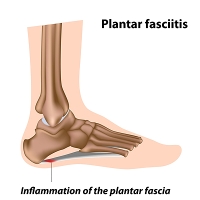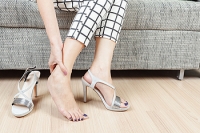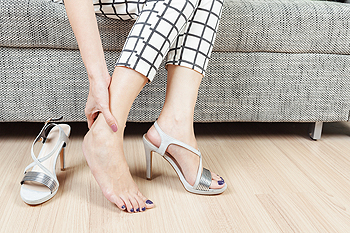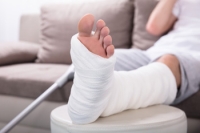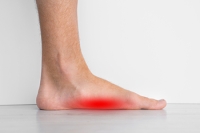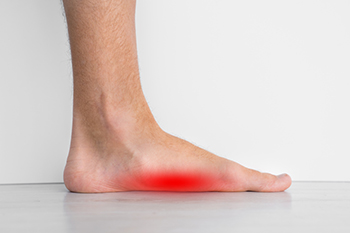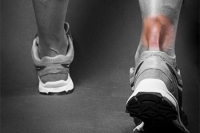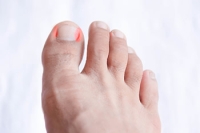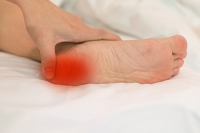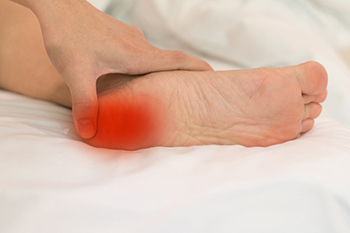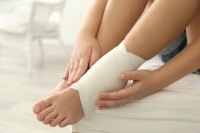
Blog (809)
Risk Factors Associated With Plantar Fasciitis
 Plantar fasciitis is a common foot injury in which the plantar fascia becomes inflamed. The plantar fascia is a ligament that runs along the bottom of the foot, connecting the heel bone to the toes. This ligament can become damaged when it is strained through repetitive overuse or a sudden increase in physical activity, such as running. Standing for prolonged periods of time, exercising on hard surfaces, and wearing shoes that lack proper support or fit poorly can also injure the plantar fascia. People who have flat feet or high arches, are overweight, have had foot or ankle injuries, or are over age 40 are more likely to develop plantar fasciitis. If you are suffering from foot pain, please seek the care of a podiatrist for diagnosis and treatment options.
Plantar fasciitis is a common foot injury in which the plantar fascia becomes inflamed. The plantar fascia is a ligament that runs along the bottom of the foot, connecting the heel bone to the toes. This ligament can become damaged when it is strained through repetitive overuse or a sudden increase in physical activity, such as running. Standing for prolonged periods of time, exercising on hard surfaces, and wearing shoes that lack proper support or fit poorly can also injure the plantar fascia. People who have flat feet or high arches, are overweight, have had foot or ankle injuries, or are over age 40 are more likely to develop plantar fasciitis. If you are suffering from foot pain, please seek the care of a podiatrist for diagnosis and treatment options.
Plantar fasciitis can be very painful and inconvenient. If you are experiencing heel pain or symptoms of plantar fasciitis, contact Dr. Kenneth Donovan from Advanced Care Foot and Ankle. Our doctor can provide the care you need to keep you pain-free and on your feet.
What Is Plantar Fasciitis?
Plantar fasciitis is the inflammation of the thick band of tissue that runs along the bottom of your foot, known as the plantar fascia, and causes mild to severe heel pain.
What Causes Plantar Fasciitis?
- Excessive running
- Non-supportive shoes
- Overpronation
- Repeated stretching and tearing of the plantar fascia
How Can It Be Treated?
- Conservative measures – anti-inflammatories, ice packs, stretching exercises, physical therapy, orthotic devices
- Shockwave therapy – sound waves are sent to the affected area to facilitate healing and are usually used for chronic cases of plantar fasciitis
- Surgery – usually only used as a last resort when all else fails. The plantar fascia can be surgically detached from the heel
While very treatable, plantar fasciitis is definitely not something that should be ignored. Especially in severe cases, speaking to your doctor right away is highly recommended to avoid complications and severe heel pain. Your podiatrist can work with you to provide the appropriate treatment options tailored to your condition.
If you have any questions please feel free to contact one of our offices located in Warren, Livingston, and Toms River, NJ . We offer the newest diagnostic and treatment technologies for all your foot and ankle needs.
Scary Consequences of Wearing High Heels
If you often wear high heels, it is suggested that you switch to flatter, wider, and more comfortable shoes. Why? Frequently wearing high heels holds your feet into an unnatural position, forcing the balls of your feet to bear too much weight, squishing your toes together, and sometimes even changing the way that you walk. Some of the foot and ankle issues caused or made worse by wearing high heels include corns, calluses, hammertoes, bunions, Haglund’s deformity, blisters, nail problems, plantar fasciitis, Morton’s neuroma, metatarsalgia, stress fractures, ankle injuries, and a tight Achilles tendon. If you are afflicted with any of these conditions, it is strongly advised that you seek the care of a podiatrist.
High heels have a history of causing foot and ankle problems. If you have any concerns about your feet or ankles, contact Dr. Kenneth Donovan from Advanced Care Foot and Ankle. Our doctor can provide the care you need to keep you pain-free and on your feet.
Effects of High Heels on the Feet
High heels are popular shoes among women because of their many styles and societal appeal. Despite this, high heels can still cause many health problems if worn too frequently.
Which Parts of My Body Will Be Affected by High Heels?
- Ankle Joints
- Achilles Tendon – May shorten and stiffen with prolonged wear
- Balls of the Feet
- Knees – Heels cause the knees to bend constantly, creating stress on them
- Back – They decrease the spine’s ability to absorb shock, which may lead to back pain. The vertebrae of the lower back may compress.
What Kinds of Foot Problems Can Develop from Wearing High Heels?
- Corns
- Calluses
- Hammertoe
- Bunions
- Morton’s Neuroma
- Plantar Fasciitis
How Can I Still Wear High Heels and Maintain Foot Health?
If you want to wear high heeled shoes, make sure that you are not wearing them every day, as this will help prevent long term physical problems. Try wearing thicker heels as opposed to stilettos to distribute weight more evenly across the feet. Always make sure you are wearing the proper shoes for the right occasion, such as sneakers for exercising. If you walk to work, try carrying your heels with you and changing into them once you arrive at work. Adding inserts to your heels can help cushion your feet and absorb shock. Full foot inserts or metatarsal pads are available.
If you have any questions please feel free to contact one of our offices located in Warren, Livingston, and Toms River, NJ . We offer the newest diagnostic and treatment technologies for all your foot and ankle needs.
It's Time for Beautiful Feet
How to Tell if You’ve Broken a Foot Bone
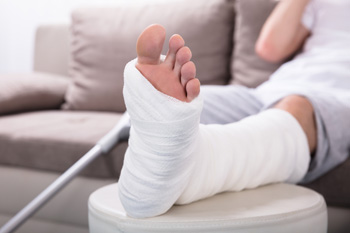 The three main signs of a broken bone, or fracture, are pain, swelling, and deformity around the bone involved. At the time of injury, you may feel or hear a snapping or grinding in the foot. The area will likely be tender, swollen, and bruised. Putting weight or pressure on the injured area will cause pain. You may also be able to see where the bone is broken or displaced, particularly if it is an open fracture, where the bone pokes through the skin. Sometimes the signs of a foot fracture are not obvious. Stress fractures, which are tiny cracks that develop in a bone over time, are very common in the foot bones and often produce only mild symptoms. If you suspect that you have broken a foot bone, please seek the care of a podiatrist.
The three main signs of a broken bone, or fracture, are pain, swelling, and deformity around the bone involved. At the time of injury, you may feel or hear a snapping or grinding in the foot. The area will likely be tender, swollen, and bruised. Putting weight or pressure on the injured area will cause pain. You may also be able to see where the bone is broken or displaced, particularly if it is an open fracture, where the bone pokes through the skin. Sometimes the signs of a foot fracture are not obvious. Stress fractures, which are tiny cracks that develop in a bone over time, are very common in the foot bones and often produce only mild symptoms. If you suspect that you have broken a foot bone, please seek the care of a podiatrist.
A broken foot requires immediate medical attention and treatment. If you need your feet checked, contact Dr. Kenneth Donovan from Advanced Care Foot and Ankle. Our doctor can provide the care you need to keep you pain-free and on your feet.
Broken Foot Causes, Symptoms, and Treatment
A broken foot is caused by one of the bones in the foot typically breaking when bended, crushed, or stretched beyond its natural capabilities. Usually the location of the fracture indicates how the break occurred, whether it was through an object, fall, or any other type of injury.
Common Symptoms of Broken Feet:
- Bruising
- Pain
- Redness
- Swelling
- Blue in color
- Numbness
- Cold
- Misshapen
- Cuts
- Deformities
Those that suspect they have a broken foot shoot seek urgent medical attention where a medical professional could diagnose the severity.
Treatment for broken bones varies depending on the cause, severity and location. Some will require the use of splints, casts or crutches while others could even involve surgery to repair the broken bones. Personal care includes the use of ice and keeping the foot stabilized and elevated.
If you have any questions please feel free to contact one of our offices located in Warren, Livingston, and Toms River, NJ . We offer the newest diagnostic and treatment technologies for all your foot and ankle needs.
How Are Flat Feet Diagnosed?
Flat feet are a type of foot structure in which the arch, usually located in the middle of the sole of the foot, is absent or is only visible when the foot is not bearing weight. Some people are born with flat feet. Others have an arch that has collapsed over time. The latter are more prone to foot pain. When diagnosing flat feet, your podiatrist will examine the feet closely while you sit or stand and hold your foot in various positions. They may also look at the insides of your shoes. People with flat feet often have more wear on the inside of the sole. For more information about flat feet, please consult with a podiatrist.
Flatfoot is a condition many people suffer from. If you have flat feet, contact Dr. Kenneth Donovan from Advanced Care Foot and Ankle. Our doctor will treat your foot and ankle needs.
What Are Flat Feet?
Flatfoot is a condition in which the arch of the foot is depressed and the sole of the foot is almost completely in contact with the ground. About 20-30% of the population generally has flat feet because their arches never formed during growth.
Conditions & Problems:
Having flat feet makes it difficult to run or walk because of the stress placed on the ankles.
Alignment – The general alignment of your legs can be disrupted, because the ankles move inward which can cause major discomfort.
Knees – If you have complications with your knees, flat feet can be a contributor to arthritis in that area.
Symptoms
- Pain around the heel or arch area
- Trouble standing on the tip toe
- Swelling around the inside of the ankle
- Flat look to one or both feet
- Having your shoes feel uneven when worn
Treatment
If you are experiencing pain and stress on the foot you may weaken the posterior tibial tendon, which runs around the inside of the ankle.
If you have any questions please feel free to contact one of our offices located in Warren, Livingston, and Toms River, NJ . We offer the newest diagnostic and treatment technologies for all your foot and ankle needs.
Understanding Achilles Tendon Injuries
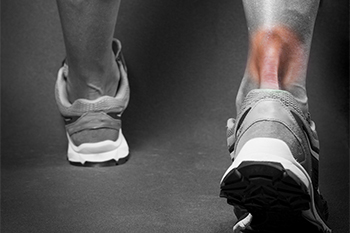 On the back of the ankle, there is a thick band of tissue that connects the calf to the heel bone. This is known as the Achilles tendon. If this tendon becomes inflamed near the heel bone, usually due to overuse, it is known as Achilles tendonitis. Patients who have Achilles tendonitis often experience stiffness in the Achilles area, pain in the back of the heel, and swelling. If left untreated, Achilles tendonitis can cause the tendon to degenerate resulting in Achilles tendinosis. If the fibers in the tendon tear (either partially or completely), it is known as an Achilles tendon rupture, which is one of the most severe injuries that can occur to that area. Patients who have pain or stiffness around their Achilles tendon should have it looked at by a podiatrist who can properly diagnose and treat their condition.
On the back of the ankle, there is a thick band of tissue that connects the calf to the heel bone. This is known as the Achilles tendon. If this tendon becomes inflamed near the heel bone, usually due to overuse, it is known as Achilles tendonitis. Patients who have Achilles tendonitis often experience stiffness in the Achilles area, pain in the back of the heel, and swelling. If left untreated, Achilles tendonitis can cause the tendon to degenerate resulting in Achilles tendinosis. If the fibers in the tendon tear (either partially or completely), it is known as an Achilles tendon rupture, which is one of the most severe injuries that can occur to that area. Patients who have pain or stiffness around their Achilles tendon should have it looked at by a podiatrist who can properly diagnose and treat their condition.
Achilles tendon injuries need immediate attention to avoid future complications. If you have any concerns, contact Dr. Kenneth Donovan of Advanced Care Foot and Ankle. Our doctor can provide the care you need to keep you pain-free and on your feet.
What Is the Achilles Tendon?
The Achilles tendon is a tendon that connects the lower leg muscles and calf to the heel of the foot. It is the strongest tendon in the human body and is essential for making movement possible. Because this tendon is such an integral part of the body, any injuries to it can create immense difficulties and should immediately be presented to a doctor.
What Are the Symptoms of an Achilles Tendon Injury?
There are various types of injuries that can affect the Achilles tendon. The two most common injuries are Achilles tendinitis and ruptures of the tendon.
Achilles Tendinitis Symptoms
- Inflammation
- Dull to severe pain
- Increased blood flow to the tendon
- Thickening of the tendon
Rupture Symptoms
- Extreme pain and swelling in the foot
- Total immobility
Treatment and Prevention
Achilles tendon injuries are diagnosed by a thorough physical evaluation, which can include an MRI. Treatment involves rest, physical therapy, and in some cases, surgery. However, various preventative measures can be taken to avoid these injuries, such as:
- Thorough stretching of the tendon before and after exercise
- Strengthening exercises like calf raises, squats, leg curls, leg extensions, leg raises, lunges, and leg presses
If you have any questions please feel free to contact one of our offices located in Warren, Livingston, and Toms River, NJ . We offer the newest diagnostic tools and technology to treat your foot and ankle needs.
Heel Pain Can Be Treated!
What Is an Ingrown Toenail?
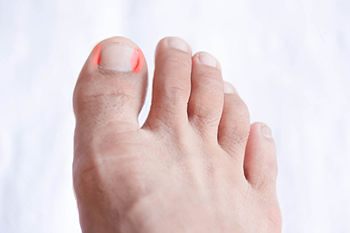 When the toenail curls downwards and into the skin surrounding the nail, it is referred to as an ingrown toenail. Common signs of an ingrown toenail include pain, redness, and swelling. Ingrown toenails can become infected if they are not treated. Ingrown toenails can form from a variety of reasons, such as shoes that are too tight, not properly trimming the toenails, excessively sweaty feet, or trauma to the toe. Patients who are struggling with an ingrown toenail may be able to find relief by soaking their feet in warm water for around 15 minutes a few times a day. However, ingrown toenails that persist should be looked at by a podiatrist in order to prevent an infection.
When the toenail curls downwards and into the skin surrounding the nail, it is referred to as an ingrown toenail. Common signs of an ingrown toenail include pain, redness, and swelling. Ingrown toenails can become infected if they are not treated. Ingrown toenails can form from a variety of reasons, such as shoes that are too tight, not properly trimming the toenails, excessively sweaty feet, or trauma to the toe. Patients who are struggling with an ingrown toenail may be able to find relief by soaking their feet in warm water for around 15 minutes a few times a day. However, ingrown toenails that persist should be looked at by a podiatrist in order to prevent an infection.
Ingrown toenails can become painful if they are not treated properly. For more information about ingrown toenails, contact Dr. Kenneth Donovan of Advanced Care Foot and Ankle. Our doctor can provide the care you need to keep you pain-free and on your feet.
Ingrown Toenails
Ingrown toenails occur when a toenail grows sideways into the bed of the nail, causing pain, swelling, and possibly infection.
Causes
- Bacterial infections
- Improper nail cutting such as cutting it too short or not straight across
- Trauma to the toe, such as stubbing, which causes the nail to grow back irregularly
- Ill-fitting shoes that bunch the toes too close together
- Genetic predisposition
Prevention
Because ingrown toenails are not something found outside of shoe-wearing cultures, going barefoot as often as possible will decrease the likeliness of developing ingrown toenails. Wearing proper fitting shoes and using proper cutting techniques will also help decrease your risk of developing ingrown toenails.
Treatment
Ingrown toenails are a very treatable foot condition. In minor cases, soaking the affected area in salt or antibacterial soaps will not only help with the ingrown nail itself, but also help prevent any infections from occurring. In more severe cases, surgery is an option. In either case, speaking to your podiatrist about this condition will help you get a better understanding of specific treatment options that are right for you.
If you have any questions please feel free to contact one of our offices located in Warren, Livingston, and Toms River, NJ . We offer the newest diagnostic and treatment technologies for all your foot and ankle needs.
What to Do if Your Child Has Sever’s Disease
If your active child is suddenly complaining of foot pain, walking on their tippy toes, or limping, they may have Sever’s disease. Though the name can sound frightening, Sever’s disease is actually an injury. It occurs when the growth plate in your child’s heel bone is damaged due to repetitive strain from running, jumping, and other athletic activities. At home, you can help your child find relief by resting and icing the affected foot (it often affects both feet at once) and encouraging them to wear comfortable, supportive shoes. Seeing a podiatrist, who can prescribe orthotics, suggest exercises to help relieve symptoms, and rule out any other potential causes for your child’s pain, can also be very beneficial.
Sever's disease often occurs in children and teens. If your child is experiencing foot or ankle pain, see Dr. Kenneth Donovan from Advanced Care Foot and Ankle. Our doctor can treat your child’s foot and ankle needs.
Sever’s Disease
Sever’s disease is also known as calcaneal apophysitis, which is a medical condition that causes heel pain I none or both feet. The disease is known to affect children between the ages of 8 and 14.
Sever’s disease occurs when part of the child’s heel known as the growth plate (calcaneal epiphysis) is attached to the Achilles tendon. This area can suffer injury when the muscles and tendons of the growing foot do not keep pace with bone growth. Therefore, the constant pain which one experiences at the back of the heel will make the child unable to put any weight on the heel. The child is then forced to walk on their toes.
Symptoms
Acute pain – Pain associated with Sever’s disease is usually felt in the heel when the child engages in physical activity such as walking, jumping and or running.
Highly active – Children who are very active are among the most susceptible in experiencing Sever’s disease, because of the stress and tension placed on their feet.
If you have any questions, please feel free to contact one of our offices located in Warren, Livingston, and Toms River, NJ . We offer the newest diagnostic and treatment technologies for all your foot and ankle injuries.
What Is Extensor Tendonitis?
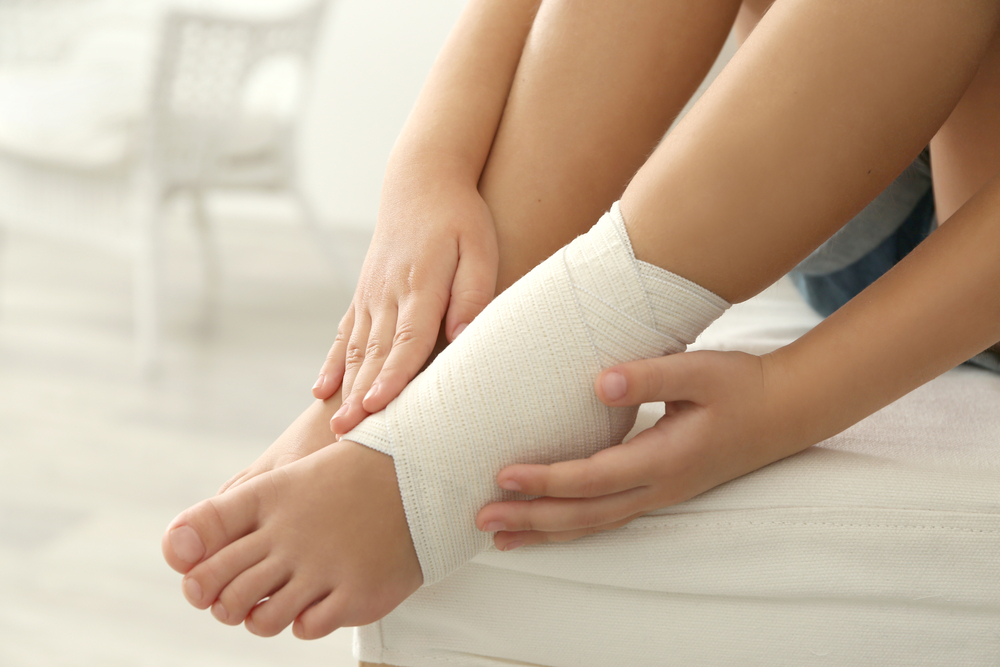 The extensor tendons are fibrous bands of tissue that run along the top of the foot, allowing you to move your toes. When these tendons are injured, usually due to repetitive strain from overuse, wearing tight shoes, or sudden training changes, they become inflamed. This causes aching pain in the top of the foot that worsens during exercise and while stretching the toes, as well as swelling over the top of the foot. Symptoms tend to develop gradually and progressively worsen. Treatments for extensor tendonitis are typically conservative and may involve resting and icing the foot, taking over-the-counter pain medications, and wearing comfortable, supportive shoes. If you are suffering from foot pain, please seek the care of a podiatrist.
The extensor tendons are fibrous bands of tissue that run along the top of the foot, allowing you to move your toes. When these tendons are injured, usually due to repetitive strain from overuse, wearing tight shoes, or sudden training changes, they become inflamed. This causes aching pain in the top of the foot that worsens during exercise and while stretching the toes, as well as swelling over the top of the foot. Symptoms tend to develop gradually and progressively worsen. Treatments for extensor tendonitis are typically conservative and may involve resting and icing the foot, taking over-the-counter pain medications, and wearing comfortable, supportive shoes. If you are suffering from foot pain, please seek the care of a podiatrist.
Sports related foot and ankle injuries require proper treatment before players can go back to their regular routines. For more information, contact Dr. Kenneth Donovan of Advanced Care Foot and Ankle. Our doctor can provide the care you need to keep you pain-free and on your feet.
Sports Related Foot and Ankle Injuries
Foot and ankle injuries are a common occurrence when it comes to athletes of any sport. While many athletes dismiss the initial aches and pains, the truth is that ignoring potential foot and ankle injuries can lead to serious problems. As athletes continue to place pressure and strain the area further, a mild injury can turn into something as serious as a rupture and may lead to a permanent disability. There are many factors that contribute to sports related foot and ankle injuries, which include failure to warm up properly, not providing support or wearing bad footwear. Common injuries and conditions athletes face, including:
- Plantar Fasciitis
- Plantar Fasciosis
- Achilles Tendinitis
- Achilles Tendon Rupture
- Ankle Sprains
Sports related injuries are commonly treated using the RICE method. This includes rest, applying ice to the injured area, compression and elevating the ankle. More serious sprains and injuries may require surgery, which could include arthroscopic and reconstructive surgery. Rehabilitation and therapy may also be required in order to get any recovering athlete to become fully functional again. Any unusual aches and pains an athlete sustains must be evaluated by a licensed, reputable medical professional.
If you have any questions please feel free to contact one of our offices located in Warren, Livingston, and Toms River, NJ . We offer the newest diagnostic and treatment technologies for all your foot and ankle needs.
